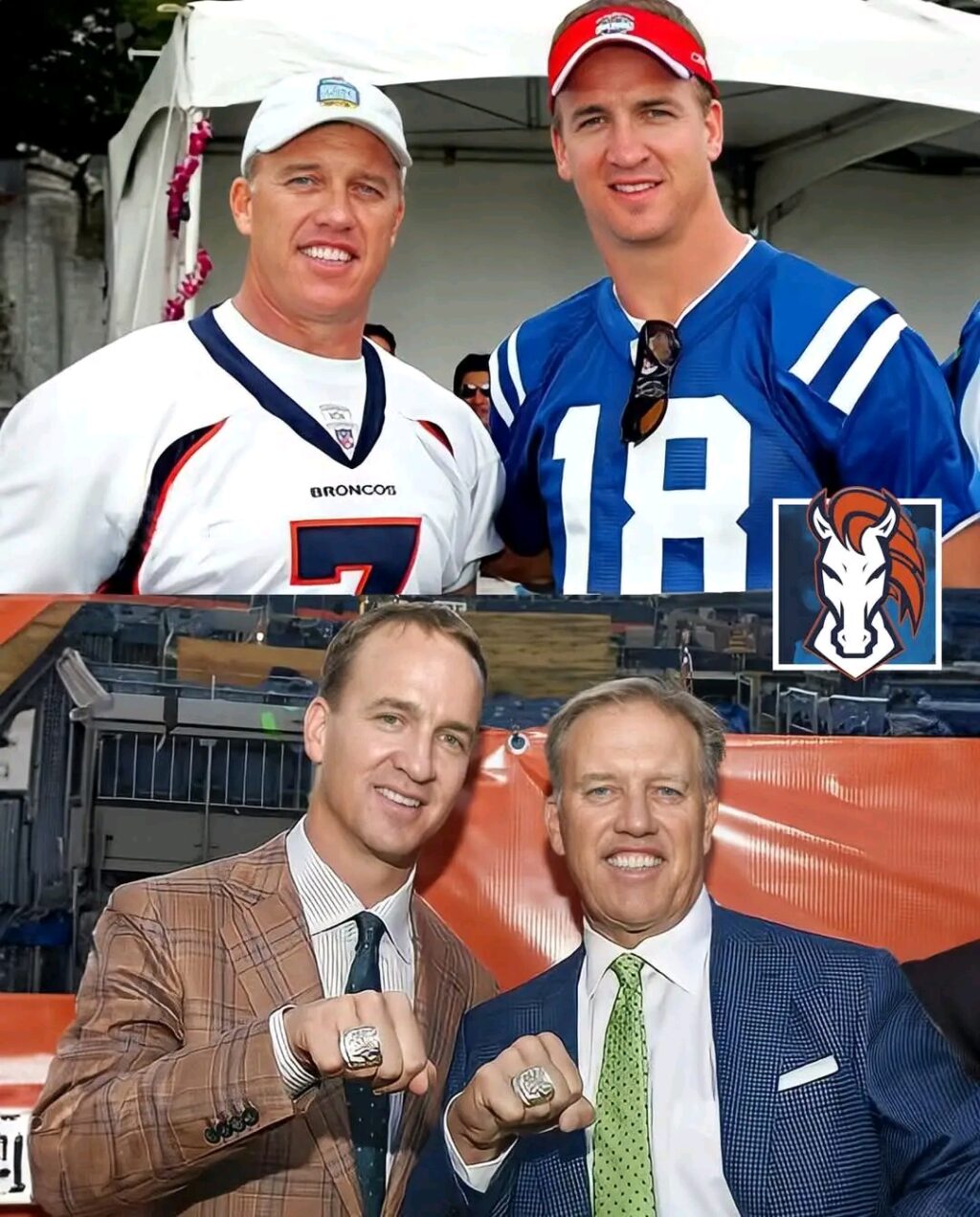
From Passing the Torch to Raising the Trophy: The Unique Bond of John Elway and Peyton Manning
In the ever-evolving world of professional football, few stories carry the weight, symbolism, and poetic justice of the relationship between John Elway and Peyton Manning—two of the most iconic quarterbacks in NFL history. Though their careers spanned different eras, their legacies converged in a way that left an indelible mark on the Denver Broncos franchise and NFL history.
The Year of Transition: 1998
The year 1998 stands as a pivotal point in NFL lore. It marked the final chapter in John Elway’s storied playing career and the opening act of Peyton Manning’s remarkable journey. That year, Elway, then 38 years old, led the Denver Broncos to a second consecutive Super Bowl victory, cementing his place as one of the greatest quarterbacks to ever play the game. His final game—Super Bowl XXXIII—was a masterful performance that closed his 16-season career on the highest of notes.
At the same time, a 22-year-old Peyton Manning, the top pick in the 1998 NFL Draft, was just beginning to make his name known in the league. Selected by the Indianapolis Colts, Manning entered the NFL with sky-high expectations, carrying the weight of a football dynasty as the son of former NFL quarterback Archie Manning and the older brother of future Super Bowl champion Eli Manning.
Though they were technically both active in the league during that 1998 season, the NFL schedule did not permit a meeting between the Broncos and Colts. Fate, it seemed, had different plans for these two quarterbacks. No head-to-head battle, no chance to pit the grizzled veteran against the ambitious rookie. But history would ensure that their stories would intertwine in a much more profound and meaningful way.
John Elway: The End of an Era
For Broncos fans, John Elway is more than just a quarterback—he’s a symbol of perseverance, excellence, and redemption. Drafted first overall in 1983, Elway’s early career was defined by repeated postseason heartbreak, including three Super Bowl losses. Yet he never gave up. He returned year after year, leading his team with heart, grit, and a rocket arm.
His crowning moment came in the twilight of his career. In the 1997 and 1998 seasons, Elway helped guide the Broncos to back-to-back Super Bowl titles, finally shaking the reputation of being unable to “win the big one.” In Super Bowl XXXIII, he threw for 336 yards and a touchdown, earning MVP honors and riding off into the sunset on the ultimate high note.
After retirement, Elway didn’t fade into obscurity. He remained deeply tied to the Broncos organization, eventually becoming their Executive Vice President of Football Operations. It was in that role that Elway made one of the most important decisions of his post-playing career—a decision that would change the course of Broncos history once again.
Peyton Manning: A Career Reborn in Denver
After 14 prolific seasons with the Indianapolis Colts, Peyton Manning faced a crossroads in 2011. A series of neck surgeries left his playing future in doubt. The Colts, meanwhile, had endured a dismal season without their star quarterback and held the first overall pick in the 2012 NFL Draft—a pick they used to select quarterback Andrew Luck.
Manning, now a free agent and coming off a major medical setback, needed a new home. Many doubted whether he could return to form. But one man saw the potential in the future Hall of Famer—John Elway.
In a bold move, Elway convinced Manning to sign with the Denver Broncos. It was a marriage of two football minds and two legacies. Elway knew what it took to win in the later stages of a career. Manning, driven and hungry, had something to prove. Together, they set their sights on a Super Bowl.
The Road to Super Bowl 50
Manning’s arrival in Denver rejuvenated the franchise. Over four seasons, he led the Broncos to two Super Bowl appearances and set numerous NFL records along the way, including the single-season touchdown pass record (55) in 2013. While Denver fell short in Super Bowl XLVIII against the Seattle Seahawks, Manning remained a force in the league.
By the 2015 season, it became evident that Manning’s physical abilities were waning. He was no longer the dominant passer of years past, and injuries hampered his playing time. But with one of the league’s most formidable defenses, led by linebacker Von Miller, and Elway’s vision from the front office, the Broncos had a championship-caliber team.
Super Bowl 50 was not a statistical showcase for Manning. He threw for just 141 yards, no touchdowns, and one interception. But it didn’t matter. The Broncos defense dismantled Cam Newton and the Carolina Panthers, and Manning—like Elway before him—walked away from the game with a Lombardi Trophy in hand.
John Elway had done for Peyton Manning what no one had done for him in his early career—he built a team around a veteran quarterback capable of one last title run. The circle was complete.
Two Legends, One Legacy
Elway and Manning never played a snap against one another. Their only overlapping season, 1998, didn’t offer the matchup fans might have dreamed of. Yet, in many ways, they are forever linked—not as rivals, but as teammates across time.
Their bond is unique. Elway handed the torch of Broncos greatness to Manning not by direct confrontation, but by faith, leadership, and belief in a shared standard of excellence. Manning, in turn, honored that torch by delivering one final Super Bowl to the franchise Elway helped build.
Off the field, both men are respected leaders and ambassadors of the game. Elway remains active in Broncos leadership, while Manning has become a media figure and potential future team owner or executive. Their contributions to football go far beyond the touchdowns, records, and rings—they’ve helped define what greatness looks like across multiple generations.
Broncos Forever
For the Denver Broncos, few symbols are more powerful than the images of Elway holding the Lombardi Trophy in 1999 and Manning doing the same in 2016. These moments are bookends of a dynasty defined not just by talent, but by vision, character, and resilience.
Both quarterbacks redefined what it meant to lead. Both overcame adversity, silenced critics, and triumphed when it mattered most. They didn’t need to face each other on the field to be linked in the annals of football history. They are Broncos legends—not just for their accomplishments, but for the values they embodied.
As Broncos fans look back at their rich history, one year—1998—stands out as the changing of the guard. One man was walking away, the other just beginning his journey. Seventeen years later, they stood united—not as quarterback and successor, but as champions, heroes, and forever Broncos.






